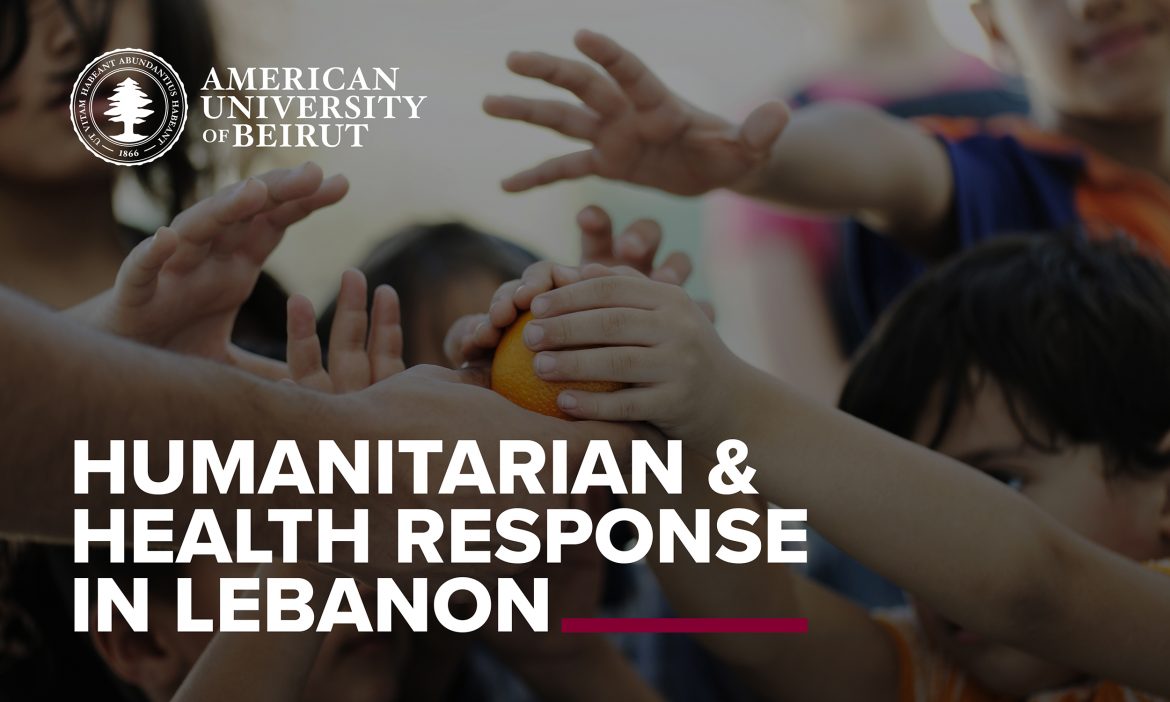The Faculty of Health Sciences (FHS) at the American University of Beirut (AUB), in collaboration with the Center for Humanitarian Leadership, the Hopkins Center for Humanitarian Health, and the Geneva Centre for Humanitarian Studies, held a critical webinar on November 6, 2024, to discuss the health and humanitarian crisis in Lebanon.
Key speakers included Dr. Firass Abiad, minister of public health; Dr. Nasser Yassine, minister of environment and head of the National Disaster and Crisis Response Operations Coordination Committee; Dr. Zeina Mohanna, executive and administrative board member at Amel Association and lecturer at AUB; and Dr. Faysal El Kak, clinical associate and director at AUB Medical Center’s Wish as well as member stage at WHO and Lecturer at AUB.
The webinar highlighted the severe impact of the current crisis on Lebanon’s healthcare system, with women and children especially affected. Objectives included presenting the humanitarian situation, analyzing emergency response challenges, and fostering collaboration for effective response and recovery.
Attended by 155 members, the webinar was moderated by Dr. Fadi El-Jardali, professor at FHS and director of the Knowledge to Policy (K2P) Center, with introductory notes by Dr. Abla Mehio Sibai, Dean of FHS, AUB.
The webinar addressed the current crisis in Lebanon, which is causing immense destruction, displacement, and loss of life. The crisis has also pushed the healthcare system to the brink, disproportionally affecting women and children. Dr. Fadi El-Jardali presented key evidence from K2P Crisis Chronicles, emphasizing the unprecedented scale of the humanitarian crises: more than one million people displaced, over 3,000 lives lost and more than 13,000 injured. Critical sectors—healthcare, housing, and water supply—have suffered extensive damage, with at least 96 primary healthcare centers and 40 hospitals closed or barely operational. Dr. El-Jardali emphasized Lebanon’s collective responsibility to mobilize resources and bridge gaps in shelter, healthcare, and protection, stating that “no one should be left behind.”
Dr. Abiad called for international protection of healthcare facilities and personnel. He emphasized the need for increased resources, better coordination, and effective utilization to strengthen and scale up the medical response. He also highlighted the importance of reinforcing public sectors and institutions which are very crucial for future response and recovery efforts. Dr. Mohanna shared NGO efforts, giving as an example the work of Amel Association. She described the multi-sectorial and multi-population response module, which provides a comprehensive range of services, including health, education, child protection, basic assistance, and food. Dr. EL-Kak commended the support provided to survivors of gender-based violence, noting, the Ministry of Public Health’s designation of six clinics and seven hospitals for follow-up care. He also highlighted part of FHS “AHLI” initiative to support displaced women’s health issues.
Dr. Yassine warned of the limited aid compared to the unprecedented needs with nearly a quarter of the Lebanese population now internally displaced. He stressed the importance of effective coordination in distributing these aids and shared links detailing the aid distribution process in a transparent manner. He concluded by urging all to “push, lobby and advocate to stop this war.”
In closing, Dr. El-Jardali stressed that current actions—whether small initiatives or large-scale interventions—lay the foundation for Lebanon’s recovery, noting, “Every step, partnership, and resource mobilized brings us closer to restoring health and hope.”
Dean Sibai asserted that each cycle of violence has been another test of Lebanon’s resilience and of our ability to adapt.
The webinar resulted in key takeaways including the immediate need to secure access to maternal and child health services, mental health support, and provision of essential supplies; to strengthen the healthcare system, protect medical facilities and personnel, and advocate for a diplomatic solution; and to urge the global community to provide humanitarian aid, support healthcare infrastructure, and advocate for a peaceful resolution.
Watch the full webinar here: https://youtu.be/pbQLXy2-PoA
For details on humanitarian aid distribution to each governorate: https://bit.ly/3NynfiV
For medical aid distribution details: https://bit.ly/3UpvSAh
For details about how the High Relief Committee is distributing the aid: http://hrc-lebanon.gov.lb
About AUB
Founded in 1866, the American University of Beirut bases its educational philosophy, standards, and practices on the American liberal arts model of higher education. A teaching-centered research university, AUB has more than 750 full-time faculty members and a student body of over 8000 students. AUB currently offers more than 140 programs leading to bachelor’s, master’s, MD, and PhD degrees. It provides medical education and training to students from throughout the region at its Medical Center that includes a full-service 365-bed hospital.
Stay up to date on AUB news and events.
aub.edu.lb |Facebook |X

